Poor customer service is hard to forget. One mistake and you are out. Businesses understand it better than ever. As a result, skilled customer service representatives are in high demand.
It is clear that you can’t have happy customers without offering amazing support. Period.
But which customer service skills translate into great customer service experiences? Is good service more than solving a customer’s issue?
In this article:
- Customer service hard skills and soft skills
- What personality traits make a good customer support rep
- How to improve customer service skills
- How to list your service skills on a resume
If you want to learn more about delivering excellent customer service, you can also read:
- Do You Know What Customer Service Means at All?
- What is Customer Retention? 8 Best Strategies [+Apps]
- 7 Ways to Deliver Excellent Customer Service [Examples & Tips]
- Customer Success Essentials [Metrics, Stories, & More]
- Customer Support vs. Service [Definition + Software]
Now—
What are the best customer service skills and traits?
Here is our list of good customer service soft skills, hard skills, and personality traits.
Soft skills for customer service:
- Emotional intelligence
- Body language
- Clear communication
- Active listening
- Conflict resolution
- Decision making
- Problem solving
- Time management
Hard skills for customer service:
- Foreign language fluency
- Technical knowledge
- Typing speed
- Knowledge of CRM software
- Microsoft Office/Google Docs Editors
- Live chat, chatbots, and email software
Personality traits for customer service representatives:
Learn how to improve customer service and recreate in-store experiences
Let’s discuss each of these customer service core competencies in detail.
If you need general training, you may also be interested in joining a training program for agents. Here are some of our recommended courses and useful exercises: 19 Best Customer Service Training Programs & Activities
1. Emotional intelligence
Emotional intelligence (EQ) is the ability to recognize and manage emotions. This refers both to your own emotions as well as those of your customers.
High levels of emotional intelligence and empathy are critical for dealing with customers. It has become one of the main criteria for employee development. People with high emotional intelligence outperform employees with high IQ but low EQ.
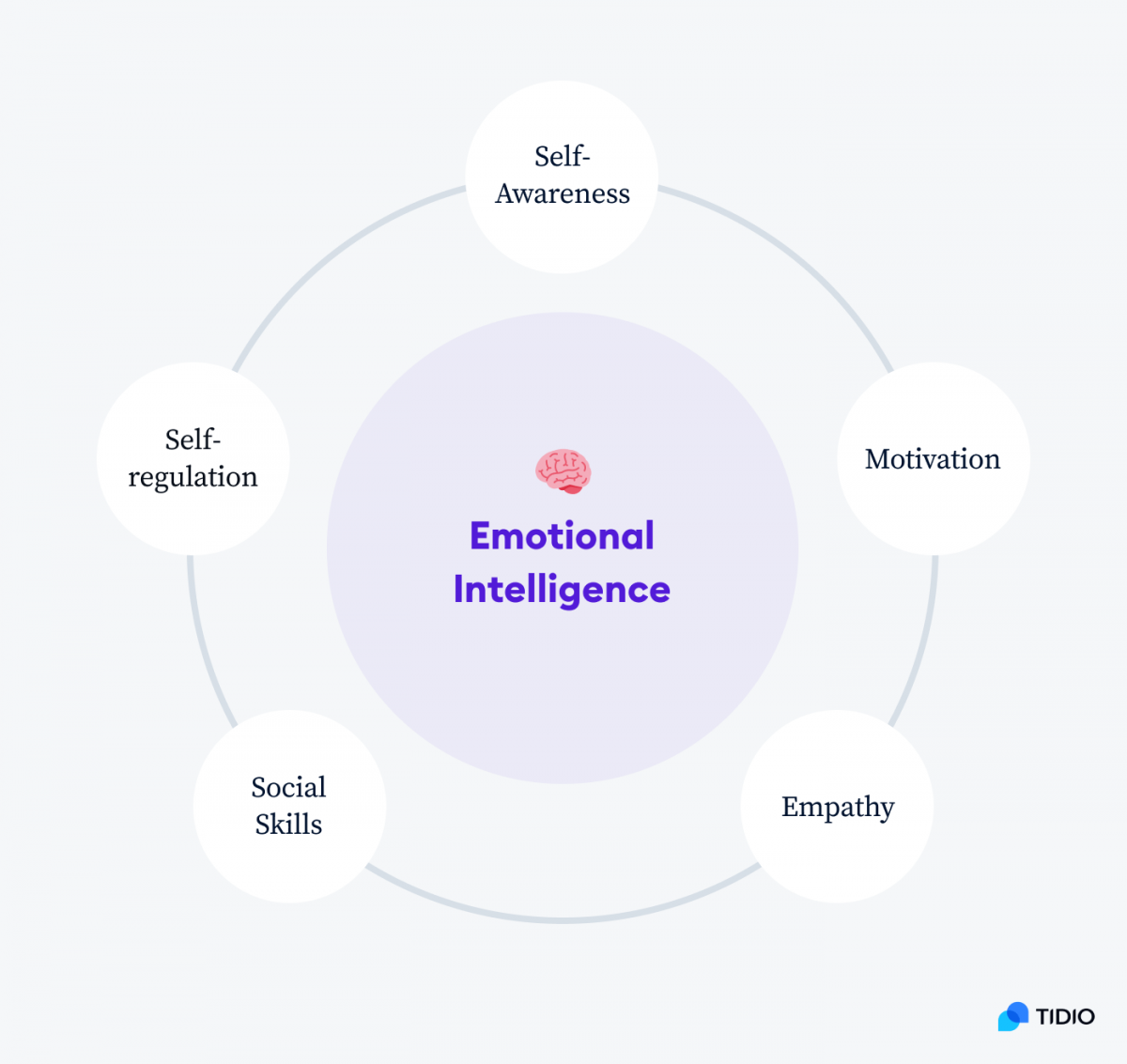
Many modern organizations use EQ assessments on a regular basis. It is one of the essential customer service skills.
There is a very strong correlation between your emotional intelligence and your results as a support agent. On average, high-performing customer service representatives get better scores on emotional intelligence tests. A report by TalentSmart demonstrates that they score 17% higher than engineering and 3% higher than sales departments.
Empathy is the most important component of EQ for customer service jobs. A good agent should be able to see every problem through the customer’s eyes. Here are some useful resources that will help you develop and improve EQ—especially empathy:
- 13 Best Emotional Intelligence Activities & Exercises
- Useful Phrases That Convey Empathy to Customers
2. Positive body language
The role of body language in retail customer service is invaluable. However, it is difficult to put it into an easily definable framework. Some say that 90% of communication is body language. Others argue that 55% is nonverbal, 38% is the tone of voice, and the remaining 7% are words and their meaning as such.
It is difficult to measure the exact impact of your posture or voice. But controlling your body language is a necessary skill for a customer service agent. Unless you are using live chat or other text-based types of customer service, obviously.
Proper posture might be instinctive for you already. But the ability to communicate through body language is also something you can learn. Make sure to:
- Maintain eye contact with a customer (but do not stare at them)
- Smile and nod to acknowledge customers and what they say
- Try to use a calm, low-pitch voice that is not too dynamic
- Observe the behavior of your customers to read what’s on their minds (e.g., if they are irritated or in a hurry)
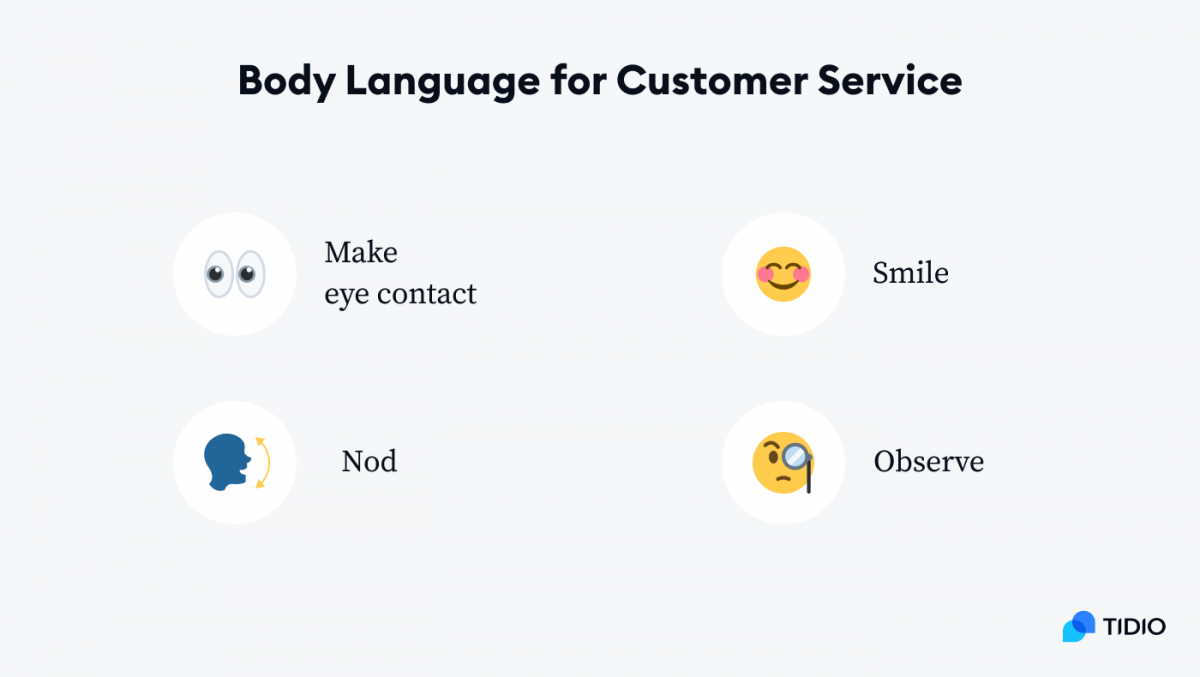
If you want to learn more about conveying the right message through your body language or read your customers’ body language like a book, check out:
- How to Read Your Customer: The Body Language of Yes and No
- 6 Tips for Increasing Customer Satisfaction Through Positive Body Language
3. Clear communication
Have you ever tried to make a written transcript of your conversation? Sometimes we may think we are communicating in a clear and effective manner. But in fact, most of our everyday conversations with friends are very chaotic and choppy. Chatting with someone is very different from explaining a complex technical issue.
Cohesive communication is one of the most important items on our customer service skills list. Fortunately, you can communicate with your customers very effectively using fine-tuned canned responses. Today, there is no need to come up with original answers to every question from scratch and write new messages. You can achieve clear communication by crafting and perfecting your regular set of canned replies.
Obviously, troubleshooting unusual issues will still require your full attention. You can always reach a good communication level with customers if you follow a process. For example, you should break down your instructions into several steps. Ask for feedback after each step and rephrase the instructions that were misunderstood. This way you can clear up any issue.
Here are two interesting pieces on improving your communication skills for customer service:
- 15 Tips for Better Customer Service Communication
- 7 Rules for Effective Customer Service Communication
4. Active listening
Active listening is a technique that uses paraphrasing and reading non-verbal conversation cues. It gives you more insights about customers and allows you to follow their train of thought. Active listening is equally essential when interacting through office phone systems or live chat tools, as you have to comprehend customers’ needs and concerns quickly and accurately. By asking follow-up questions you ensure that you are on the same side.
Our recent customer experience survey shows that businesses are very bad at listening to customers. Only 17% of customers believe that online businesses listen to them. It is a little bit surprising since the problem is easy to address. You can instantly improve the quality of customer experience by using proven formulas.
Some of the most powerful phrases that you can ask to steer customer service conversations in the right direction are:
- Could you tell me a little bit more?
- It sounds like you are experiencing [X], am I correct?
- I’m sorry you have to go through that
- It would make me angry too
- Let’s make sure that I’ve got everything right
By using active listening skills you show a customer that you understand them. It allows you to make an instant connection. Active listening helps to convey that their problems are your problems too and you feel responsible for finding a solution.
Further readings to improve your customer service active listening skills:
5. Conflict resolution
In customer service, conflict resolution and de-escalation techniques are used every day. To deliver good customer service, an agent should be a good negotiator and know how to calm down a raging bull.
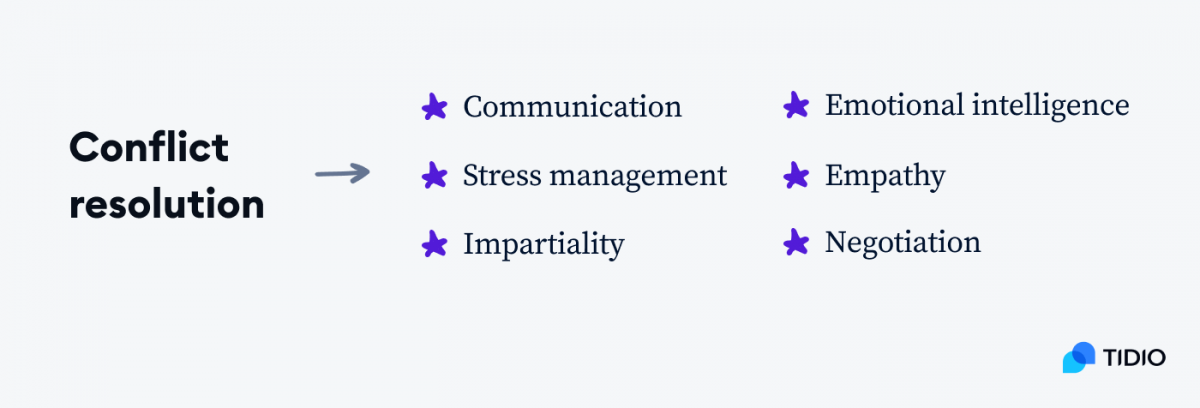
Being able to deal with customer complaints and angry customers can be hard at first. But you can learn some useful statements and tricks to turn those situations around:
- Stay calm and don’t argue, even if you are right
- Withhold your judgment and keep your opinions to yourself
- Use empathy, apologize to your customers, and show that you understand how they feel
- Offer a solution and describe the end result
- Provide different alternatives and empower the customer to make the ultimate decision
- Shift the focus of the conversation on achieving the outcomes described before
- Make sure that the problem has been solved
- Thank your customer for providing feedback and bringing the problem to your attention
If you want to find out more about resolving difficult situations with unhappy clients, read:
- How to Handle Customer Complaints [10+ Response Examples]
- How to Deal With Angry Customers in 5 Easy Steps [Tips & Examples]
6. Decision making
Working as a customer support agent requires thinking on your feet. You don’t have to always make the best decision. But you need to be decisive and display confidence. Customers want to be taken care of—and they won’t trust you if you don’t know what you are doing. You should, at the very least, try to make a good impression.
If you want to make a good impression and make the best decisions, keep the following things in mind:
- Focus on your goal. Think what is the ultimate reason why customers reach out to you.
- Make decisions fast. Try to develop a habit of making decisions quickly. Even if something goes wrong, it will be a valuable lesson for the future.
- When in doubt, dig deeper. If you can’t decide on the right solution, it may mean that you don’t have enough information. It’s a good idea to ask the customer for details.
- Ask for help if you need it. Consult with someone who knows more about the topic if you still can’t decide on your best option.
Be careful! Being decisive does not mean that you can make arbitrary judgments. You should make sure what kind of decisions you are allowed to make and which ones are beyond your competencies. Your future customer success manager should prepare a well-defined policy. Situations such as giving discounts or accepting returns should be spelled out. Just stick to the rules.
7. Problem solving
The primary job of a customer support agent is to solve the problems of customers. And you can’t really do that if you are not willing to experiment, analyze, and try out different approaches. Sometimes you’ll have to be very creative and think outside the box.
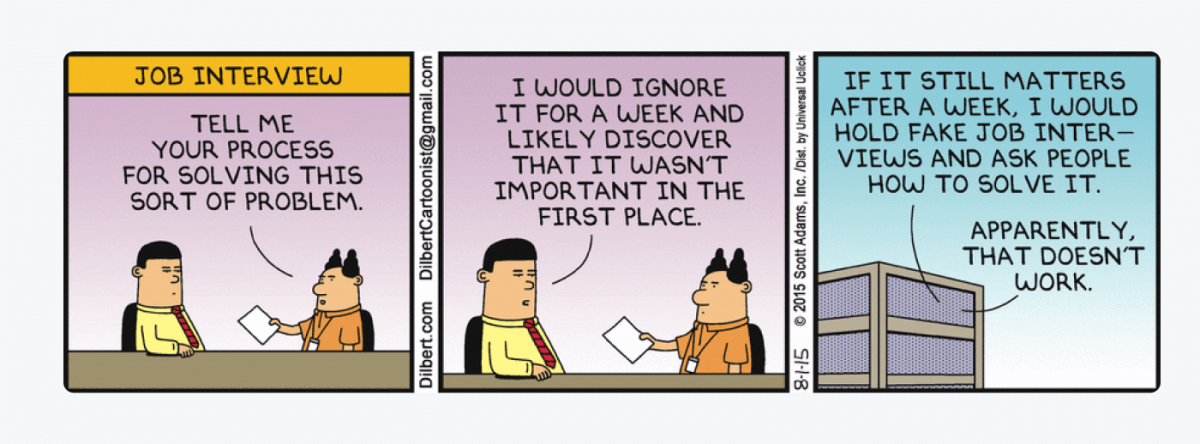
You can solve anything if you break down the process into smaller steps. Follow this pattern to deal with any challenge thrown your way:
- Describe the problem in your own words and make sure that you understand it
- Check if someone solved a similar problem already (and how they did it)
- Prepare a list of possible solutions and analyze their pros and cons.
- Eliminate the most difficult, expensive, or otherwise impossible and prohibitive ideas
- Determine your main course of action and a backup plan
- Put the plan into action and see if it works. Try to draw additional conclusions and go back to step 1 if it doesn’t.
The most important part of problem-solving is identifying what the problem actually is. You should always try to dig deeper and understand why a customer wants to achieve something.
For example, people keep asking how to trigger automatic messages with Tidio’s JavaScript API. But when our agents ask some follow-up questions it turns out that those users don’t need the API. They can create chatbots to reach their goals instead.
8. Time management
Multitasking is a myth. People can’t really handle many processes simultaneously. But what they can do is divide their time into smaller chunks and use it more effectively. It is another important customer service skill.
There is a very simple way to help your customers around the clock. Many businesses improve customer experience with AI chatbots. In some situations, you don’t need a customer support team at all. One bot can do the job. Find out how to start with Tidio chatbots here.
But customer service is usually very hectic in itself, right? Do we need to organize our time and work at all? Isn’t it just about dealing with incoming calls as they pile up?
Well, things get complicated if you handle one “important” case for three hours and try to catch up by speeding up during the rest of the day.
It may be a good idea to start using time and task management techniques. For example, the Eisenhower Matrix can help you decide which tasks to prioritize.
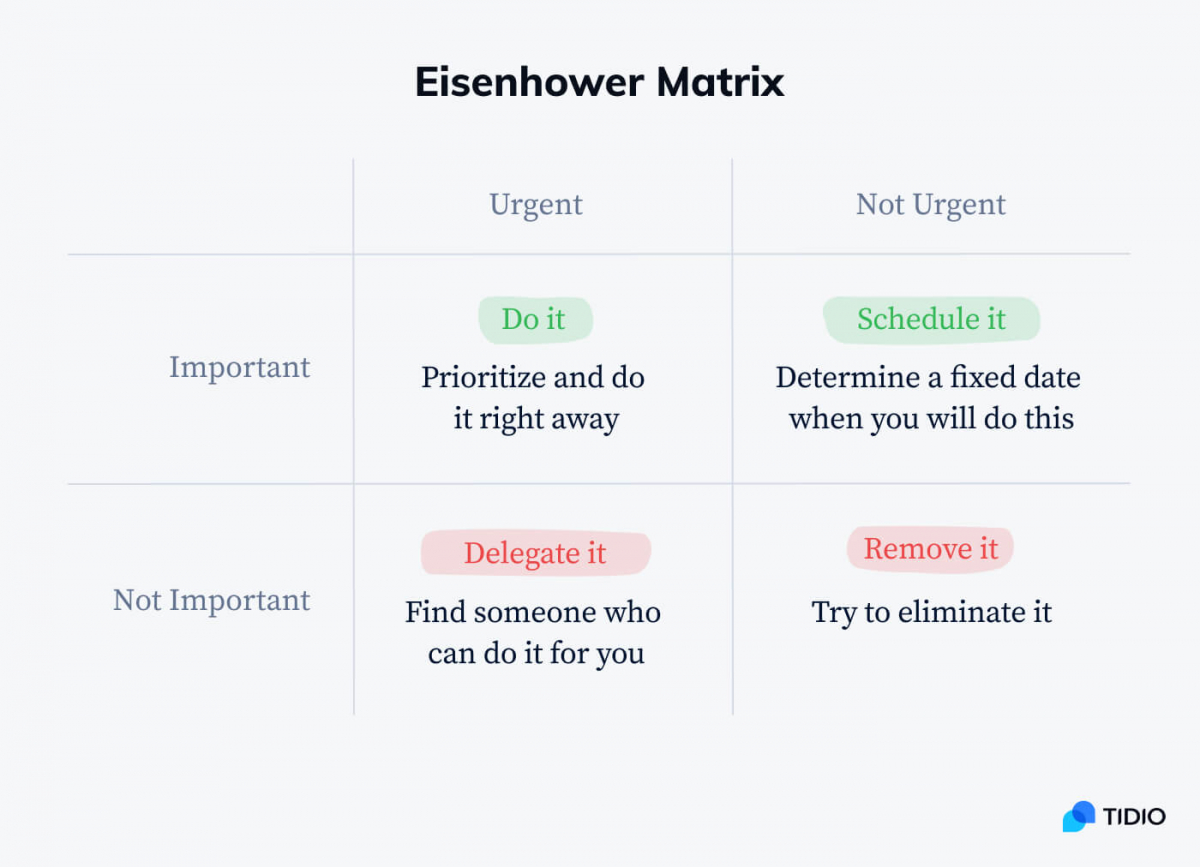
Try to measure how long it takes to provide assistance to an average customer. Then you can determine which cases take more effort and require more time. Once you start measuring it, you can discover many patterns and insights. You’ll learn that:
- You can delegate some cases to other agents
- It’s better to take regular breaks than to do customer service marathons
- Setting benchmarks and allocating time slots improves your efficiency
- It is perfectly fine to be assertive and provide customers with resources instead of direct supervision
Time is a critical factor in customer service. You should know when to devote it to providing help and when it’s better to focus on other tasks.
Read more about time management as a tool in your customer service skillset:
9. Foreign language fluency
Customer service outsourcing is extremely popular. There are high chances that you are not a native speaker of the language that you’ll use to chat with customers. Working on your spoken language fluency is the single most important hard skill for customer service.
Interestingly, you don’t need to worry if you have a slight accent. Being able to communicate effectively is more important than perfect pronunciation. Using the right intonation and stressing critical words is something you should really pay attention to.
You shouldn’t obsess about using advanced vocabulary. Instead, try to make your language sound more natural by:
- Using filler words such as well/um/right/let’s see to make your sentences less choppy (just don’t overdo it)
- Speak out loud as you practice and record it on your mobile—listen to the recording to catch your mistakes
- Use a chatbot like Chirpy Cardinal to practice “neverending” conversations online in real-time
If you want to brush up on your English speaking skills, check out this document provided by Maryland Department of Labor:
10. Technical knowledge
People don’t call customer service for fun. They usually need technical support. This means that you must understand the ins and outs of your product. And—let’s face it—they are more likely to need help with their malfunctioning smartphone than a non-electrical device.
Good customer service agents need to be tech-savvy. There is no way around it, especially if you want to work in a corporate environment. The majority of customer service agents have to look things up on their computers and solve technical problems.
Being able to use a computer doesn’t count as a technical skill. You shouldn’t list it on your resume because it is obvious that you should be able to use it. Focus on enumerating specific software tools and technologies instead.
Understanding how products work is an essential customer service skill for SaaS companies. For example, our customer service representatives need to have extensive knowledge on:
- Ecommerce platforms and technologies
- Chatbots and conversational interfaces
- Marketing automation and email marketing
- Integrating live chat widgets on websites
If you are looking for a customer service job, it may be a good idea to show that you are familiar with the products that the company offers. It shows that you are curious and that learning new things doesn’t scare you. Doing it before your actual product knowledge training sends a good signal.
11. Typing speed
This customer service skill is pretty straightforward. The faster you type, the faster your response time. It has a direct impact on your performance as an agent and makes your life a lot easier. This skill is also quite easy to learn and measure.
Typing speed is usually measured by multiplying your accuracy and the number of words typed per minute. For example, if my typing speed is 70 words per minute but my accuracy is 92% (words without a typo), my adjusted typing speed is 64 WPM (70 WMP x 92%).
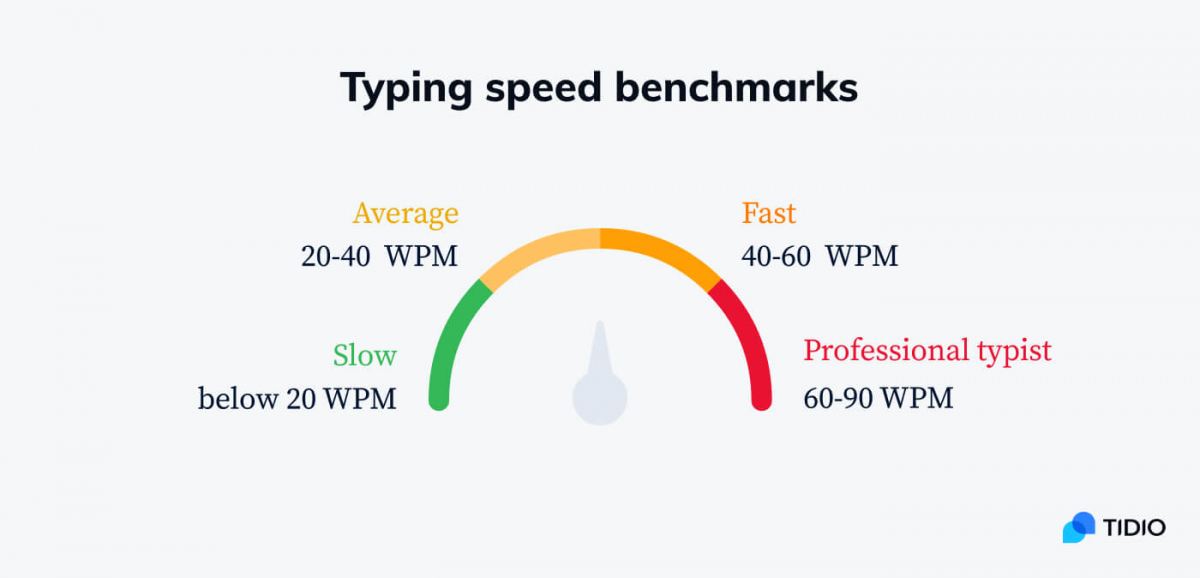
Typing speed benchmarks:
- Slow: below 20 WPM
- Average: 20-40 WPM
- Fast: 40-60 WPM
- Professional typist: 60-90 WPM
Some companies make it a formal requirement and may assess your typing speed during an interview. For example, to work at Concentrix your typing speed should be at least 35 words per minute.
Go to this website to check your typing speed:
12. Knowledge of CRM software
Customer service representatives usually use CRM software solutions such as Zendesk or Zoho. The tools are quite similar and getting used to them is only a matter of time. Still, if you have experience with a dedicated customer service app, your chances are brighter.
Some of the best apps that companies use include:
- Tidio
- Zendesk
- Salesforce
- HubSpot
- Zoho CRM
- Airtable
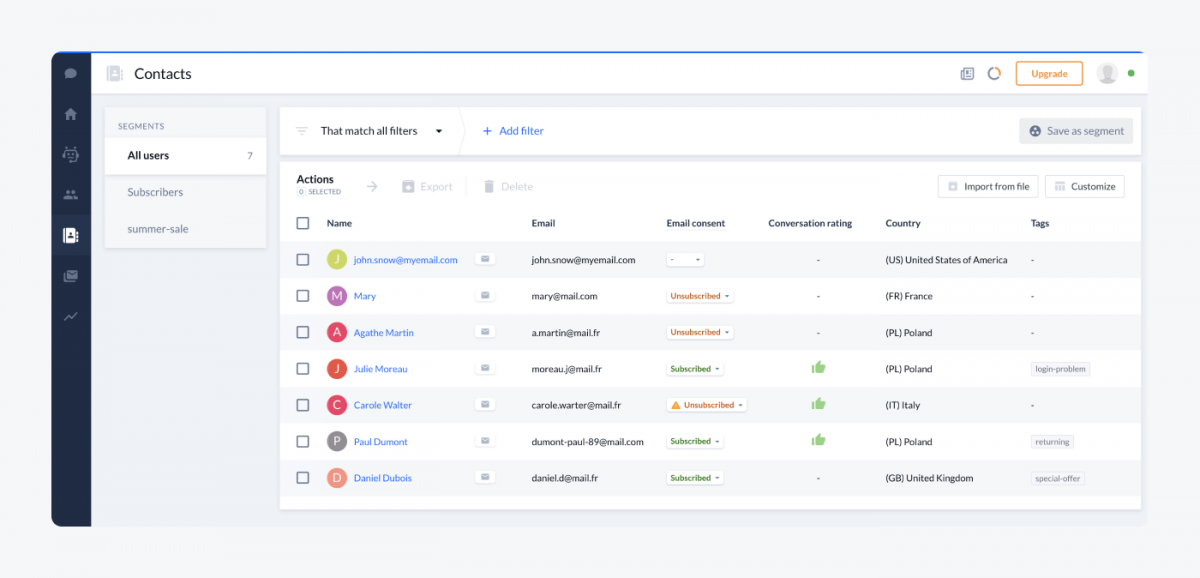
To find out more, check out our ranking of the best customer database software.
Make sure you are not confusing CRM software with project management and team collaboration apps such as Jira, Asana, Trello, or Slack.
13. Microsoft Office/Google Docs Editors
Talking to customers makes up the majority of your work as a customer service rep. But what about the rest? Well, dealing with documents, reports, and presentations is a pretty safe bet.
Sooner or later, you’ll be asked to prepare some kind of a spreadsheet or a dashboard with your results. Or write a detailed onboarding plan for new junior employees. Or help with presenting your company’s quarterly customer service KPIs.
The majority of businesses collect customer feedback by copy/pasting it into an Excel or Google Sheets file. Organizations tend to prefer Google Docs Editors because they make sharing documents easier.
Make sure to know how to create basic documents in:
- Google Docs (Word alternative)
- Google Sheets (Excel alternative)
- Google Slides (PowerPoint alternative)
14. Live chat, chatbots, and email software
The customer service landscape has changed drastically over the last several years. Today, a live chat customer service agent equipped with quick replies and AI chatbot assistants can do the work of 10 call center agents.
Why is live chat so effective? Think of using a sort of autopilot—controlling and adjusting the exchange of messages rather than writing them from scratch. An agent is supervising the customer service flow and intervenes only if they have to.
Learn how to improve customer service and recreate in-store experiences
It is also the favorite communication channel of about 46% of customers. Tools like Tidio allow you to switch between channels and provide omnichannel service. You can start a conversation through a live chat widget, continue it by exchanging emails, and finish on Facebook messenger. And you can manage everything in one dashboard. Firing up chatbots or canned messages is a matter of two clicks.
15. Determination
Determination is the ultimate personality trait for a customer service agent. You must be able to persevere and get to the bottom of a problem even when customers call you names. And you must constantly work on your customer service skills to increase customer satisfaction levels.
You need empathy to understand customers, but it can also take its toll on your mental balance. At first, the amount of work and stress can be overwhelming.
But—
If you are determined to go the extra mile and deliver amazing experiences to customers, it will give you more motivation. After some practice, you’ll learn to get everything under control.
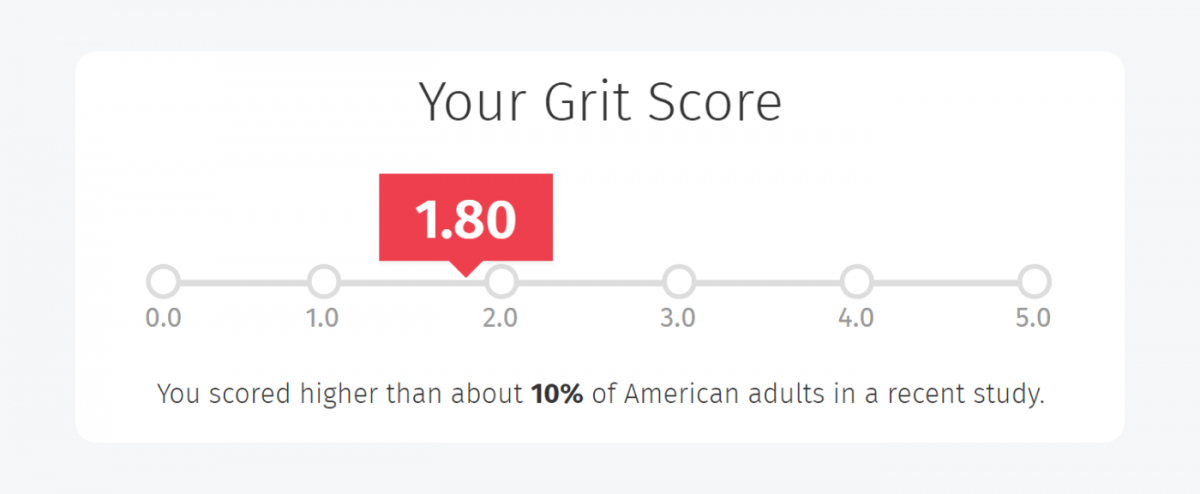
You can measure if you are a determined person by taking a test designed by Angela Ducksworth. Your Grit Score will help you understand if you need to work on the strength of your character and perseverance. For example, West Point cadets usually score higher than Ivy League undergraduates.
16. Responsibility
This one may sound like a cliche. Responsibility is something that the majority of job applicants declare as their strong side. For pretty much every position imaginable.
But, in customer service, it is really crucial that you handle every case from start to finish and never leave your clients in the dark.
The common tasks and customer service requirements include:
- Managing a high volume of incoming messages (or calls)
- Building relationships with customer
- Providing accurate information and answering customer questions
- Meeting customer problem resolution quotas
- Documenting customer interactions
- Managing customer accounts
- Increasing customer retention
You wouldn’t want an irresponsible person to take care of them all, would you?
17. Patience
Customer service professionals should be patient. They must be able to use positive language even if they are dealing with a frustrated customer.
Or if they are exchanging messages with people who take their time to type their messages in.
Incidentally, you can take a peek at customers’ messages even before they send them!

You can find more about premium features offered by one of the top customer service platforms here.
How to list customer service skills on a resume
OK, we have the complete list of excellent customer service skills. But you are probably asking yourself—which skills should I put on my resume for customer service? Surely I can’t put “nice moves and good body language” right next to my Microsoft Excel proficiency!
Skills for customer service resume:
- Active listening skills
- Adaptability
- Attentiveness
- Customer orientation
- Conflict resolution
- Cross-selling and up-selling techniques
- Familiarity with de-escalation strategies
- Great command of the language
- Good communication skills
- Interpersonal skills
- Patience
- Positive attitude
- Proactive approach
- Problem-solving skills
- Self-control
- High sense of responsibility
- Team player
- Time management
Here is an example of a resume that highlights customer service skills and qualifications:
Customer service skills resume
| John Doe Email: john.doe.666@gmail.com Phone: 202 555 019 New York, NY Resume Summary A customer service representative with 7+ years of experience and good customer service skills. Nice presentation, customer-centric approach, and familiarity with conflict resolution techniques. Ready for new challenges and increasing customer retention of your business. Work Experience Customer Service Representative, CurbServic New York, NY January 2016–June 2021 ▫️ Answered 50+ calls per day ▫️ Managed social media conversations ▫️ Helped build customer relationships ▫️ Onboarded new customer service team members Customer Service Specialist, Call Signal Brookhaven, NY August 2013–January 2016 ▫️ Handled the live chat and email communication with premium customers ▫️ Helped to organize the processes within the support team ▫️ Designed a customer support chatbot to reduce the workload by 40% ▫️ Collected feedback through customer satisfaction surveys Education Bachelor of Arts in English The Borough of Manhattan Community College Graduation: 2013 Skills ✔️ Active listening ✔️ Positive language ✔️ Up-selling ✔️ Chatbot automation ✔️ 60+ WPM typing speed ✔️ Google Docs Editors ✔️ Salesforce ✔️ Tidio ✔️ Jira |
Check out the top customer service interview questions and answers to better prepare yourself and boost your chances of getting the job.
You can become an awesome agent even without much job experience. Typical resume skills for customer service include emotional intelligence, empathy, and clear communication. The way you approach other people is more important than working for X years at a specific company.
If you need more tips on deciding which skills you should put on your customer service resume, here is a useful guide:
Takeaway
Building a customer support team is extremely difficult. If you meet several of the requirements mentioned in this article, you are already among the top. And you can improve the remaining customer service skills through practice.
Customer service representative skills that you should focus on:
- Empathy
- Self-control
- Body language
- Voice tone/cohesive writing
- Active listening
If you are looking for a job in customer service, make sure to mention at least some of them on your resume.
Still, you can always enhance the effectiveness of your customer service efforts by using the right tools. Want to try an app that turns mediocre customer service skills into great customer experiences? See what happens if you have great customer service skills already.

